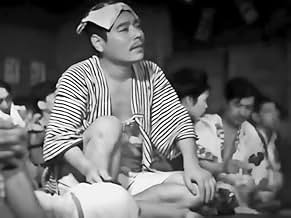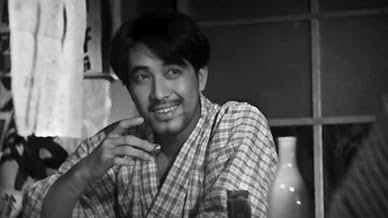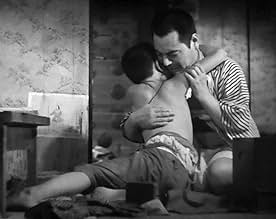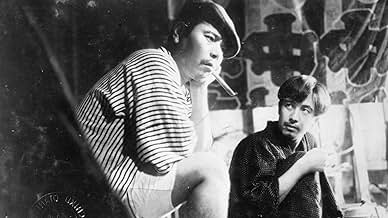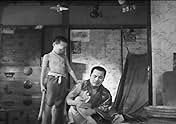CALIFICACIÓN DE IMDb
7.2/10
1.5 k
TU CALIFICACIÓN
Dos compañeros de trabajo de Tokio encuentran a joven que busca un lugar donde vivir.Dos compañeros de trabajo de Tokio encuentran a joven que busca un lugar donde vivir.Dos compañeros de trabajo de Tokio encuentran a joven que busca un lugar donde vivir.
- Premios
- 1 premio ganado en total
Den Ôhinata
- Jiro
- (as Den Obinata)
Tomio Aoki
- Tomio
- (as Tokkan Kozô)
Chishû Ryû
- Man on boat
- (sin créditos)
Hideo Sugawara
- Boy Taunting Tomio
- (sin créditos)
- Dirección
- Guionistas
- Todo el elenco y el equipo
- Producción, taquilla y más en IMDbPro
Argumento
¿Sabías que…?
- TriviaCapricho pasajero (1933) won the Kinema Junpo Award for best film, the second of three consecutive years an Yasujirô Ozu film won, following Nací, pero... (1932) and preceding Historia de hierbas flotantes (1934).
- ErroresKihachi states that 50 sen to a boy his age (referring to Tomio) is like 10 ryo to him and Otome. The ryo was replaced by the yen in 1871, over 60 years earlier. (The yen replaced the ryo at par; there are 100 sen to the yen.)
However, Otome then says, "No, more like 1,000 yen!" So, it's possible "ryo" was still being used synonymously with "yen" over a half-century later.
- ConexionesFeatured in Transcendental Style and Flatulence (2017)
Opinión destacada
Dekigokoro (Passing Fancy), is one of Ozu's 3 masterpieces from 1933. It stars the second of cinematic Ozu's "alter egos", Takeshi Sakamoto. Sakamoto typically plays a down and out working class father. Here, he is especially dense, to excellent comic effect. Tomio Aoki (in probably his most significant child role) plays a kid who seems to be considerably brighter than his father -- and who does more to keep the household running. Aoki is (of course) quite funny. But he also does an excellent job of showing a child's response to unwanted change. He and his father have long depended solely on each other -- but now his father has his eye on a young woman who has moved into their slum neighborhood. Aoki very much resents his father's interest in the woman -- and resists her attempts to win his affections.
This is an extremely visual film, with lots of completely "wordless" humor. The film starts out with an extended scene in a music hall (Chishu Ryu performing as the "singer") in which first a lost wallet circulates, and then a flea (or fleas). Probably not as great a family drama as the prior "I Was Born But" or the subsequent "Tokyo Inn", but nonetheless quite enjoyable.
This is an extremely visual film, with lots of completely "wordless" humor. The film starts out with an extended scene in a music hall (Chishu Ryu performing as the "singer") in which first a lost wallet circulates, and then a flea (or fleas). Probably not as great a family drama as the prior "I Was Born But" or the subsequent "Tokyo Inn", but nonetheless quite enjoyable.
- kerpan
- 9 sep 2003
- Enlace permanente
Selecciones populares
Inicia sesión para calificar y agrega a la lista de videos para obtener recomendaciones personalizadas
Detalles
- Tiempo de ejecución1 hora 40 minutos
- Color
- Mezcla de sonido
- Relación de aspecto
- 1.37 : 1
Contribuir a esta página
Sugiere una edición o agrega el contenido que falta

Principales brechas de datos
By what name was Capricho pasajero (1933) officially released in Canada in English?
Responda
